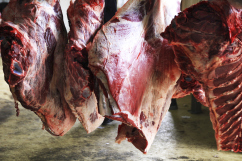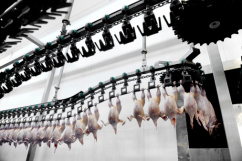Slaughter house
New slaughter regulations from Defra regarding the killing of poultry have raised concerns over the welfare of the birds with the British Veterinary Association (BVA).
The organisation is apprehensive of Defra’s decision not to include stunning parameters in the legislation when it involves poultry being slaughtered ‘in accordance with religious rites’. Despite these concerns, BVA, or the most part, has applauded the Welfare of Animals at the Time of Killing (WATOK) Regulations.

The European Food Safety Authority (EFSA) has worked hard to evaluate parameters for electrical waterbath stunning of poultry, which has led to European legislation including rules on stunning when it comes to animal welfare at slaughter.
There are fears that if rules are not clearly stated and implemented in electrical waterbath stunning for birds killed ‘in accordance with religious rites’, then the animals will be immobilised rather than stunned when it comes to slaughter. This would result in the animal still being conscious at the time of slaughter.
“In the last year we have seen headlines about the inhumane treatments of animals at slaughter and, while these new WATOK regulations are strong in many areas, we are concerned that the omission of specific parameters for electrical waterbath stunning leaves some poultry vulnerable to ineffective stunning,” explained BVA president Sean Wensley.
The BVA believes that European legislation should be practised throughout WATOK, with fears that taking away the requirements in electrical waterbath stunning may also remove the legal guarantee for effective stunning before slaughter.
In response to these issues, the BVA has voiced its concerns in a letter to Defra, seeking clarification as to how it will be ensured that the bird is stunned before the time of death.
“We have written to Defra outlining our concerns about this gap that undermines the science the regulations are built upon,” continued Wensley.
“It is difficult to see how effective stunning can be assured for all poultry if parameters are not set when poultry are killed in accordance with religious rites. Slaughtermen, official veterinarians and animal welfare officers in abattoirs are not able to tell the difference between birds that have been effectively stunned and those that are just electro-immobilised, thus compromising the animal welfare standards that these regulations are being put in place to protect.”
The Food Standards Agency (FSA) has begun the process of making unannounced visits to slaughterhouses in Great Britain, following the recent video footage from Bowood Lamb and S Bagshaw and Sons abattoirs.

Food and farming minister George Eustice made the announcement during yesterday’s debate on non-stun slaughter at Westminster Hall, after an e-petition from the British Veterinary Association, calling for the practice to be banned, gained the required 100,000 signatures.
Caroline Lucas, Green MP for Brighton Pavilion, raised the point that it may also be beneficial to improve standards in slaughterhouses, as “even things that are technically legal often involve high levels of animal cruelty”, and to look at alternative solutions such as making CCTV mandatory – something which proved popular in the Hall.
Philip Hollobone, Conservative MP for Kettering, who led the debate said he believed that “having CCTV in slaughterhouses would seem to be a helpful weapon against such abuse”, as recently highlighted in the video footage from the aforementioned abattoirs.
In response to this, Eustice told MPs: “The Food Standards Agency has begun a series of unannounced inspections of GB slaughterhouses and, by the end of March, all approved slaughterhouses will have been subject to an unannounced inspection.”
The debate:
Alongside discussions about improving slaughterhouse standards, the topics of labeling and post-cut stunning were also raised during the debate.
Many MPs called for the labeling of meat products to enable consumers to make the choice as to whether to buy meat that was either stunned, halal – stunned or un-stunned, or kosher, however there was some disagreement about where the level of detail required.
The proposal for an outright ban on non-stun slaughter appeared to be widely dismissed, however post-cut stunning, a practice used in other EU countries, was an option that many MPs felt deserved greater investigation.
John Blackwell, president, British Veterinary Association, told Meat Trades Journal: “There are clearly very strongly held views on this important animal welfare issue. We are pleased that so much public and political attention is being given to such an important animal welfare issue that affects millions of animals every year.”
Commenting on the rival e-petition, set up earlier this month, in support of non-stun slaughter, Blackwell added: “Mohammed Amin’s e-petition talks of ‘minimising pain when slaughtering’ and the scientific evidence shows that stunning before slaughter does exactly that. That is why we are campaigning for all animals to be stunned before slaughter.
“We also agree that mis-stunning is unacceptable. We continue to campaign for, and work towards, improvements in animal welfare measures inside all abattoirs, and BVA is actively calling for the implementation of the delayed welfare at slaughter regulations Welfare of Animals at Time of Killing (England) Regulations (WATOK) in England, as they have been in the rest of the UK.”